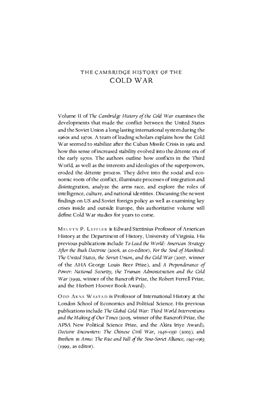Cambridge University Press, 2010. - 588 pp.
Volume Two of The Cambridge History of the Cold War examines the developments that made the Cold War into a long-lasting inteational system during the 1960s and 1970s. Leading scholars explain how the Cold War seemed to stabilize after the Cuban Missile Crisis in 1962 and how this sense of increased stability developed into the detente era of the early 1970s. They also outline how conflicts in the Third World, as well as the interests and ideologies of the superpowers, eroded the detente process. The volume delves into the social and economic histories of the conflict, processes of integration and disintegration, arms races, and the roles of intelligence, culture, and national identities. Discussing the newest findings on US and Soviet foreign policy, on key crises, on policies in and outside of Europe, and on alliances and negotiations, this authoritative volume will define Cold War studies for years to come.
Volume Two of The Cambridge History of the Cold War examines the developments that made the Cold War into a long-lasting inteational system during the 1960s and 1970s. Leading scholars explain how the Cold War seemed to stabilize after the Cuban Missile Crisis in 1962 and how this sense of increased stability developed into the detente era of the early 1970s. They also outline how conflicts in the Third World, as well as the interests and ideologies of the superpowers, eroded the detente process. The volume delves into the social and economic histories of the conflict, processes of integration and disintegration, arms races, and the roles of intelligence, culture, and national identities. Discussing the newest findings on US and Soviet foreign policy, on key crises, on policies in and outside of Europe, and on alliances and negotiations, this authoritative volume will define Cold War studies for years to come.

